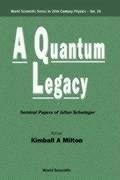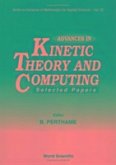Julian Schwinger (1918-1994) was one of the giants of 20th Century Science. He contributed to a broad range of topics in theoretical physics, ranging from classical electrodynamics to quantum mechanics, from nuclear physics through quantum electrodynamics to the general theory of quantum fields. Although his mathematical prowess was legendary, he was fundamentally a phenomenologist. He received many awards, including the first Einstein Prize in 1951, and the Nobel Prize in 1965, which he shared with Richard Feynman and Sin-itiro Tomonaga for the self-consistent formulation of quantum electrodynamics into a practical theory. His more than 70 doctoral students have played a decisive role in the development of science in the second half of this century. This important volume includes many of Schwinger's most important papers, on the above and other topics, such as the theory of angular momentum and the theory of many-body systems. The papers collected here continue to underlie much of the work done by theoretical physicists today.








